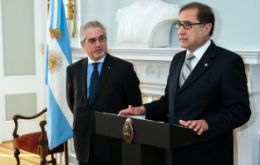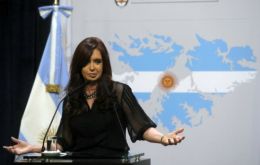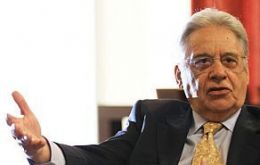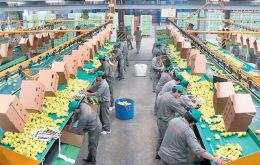MercoPress. South Atlantic News Agency
Tag: protectionist measures
-
Tuesday, September 4th 2012 - 18:26 UTC
Argentine industry asks for flexible imports but strongly supports government policies

Argentina’s Industrial Union, UIA, called on the government of President Cristina Fernandez to ease the imports of inputs for manufacturing, which is suffering from shortages caused by severe controls, although at the same time was supportive of official policies to boost industry.
-
Monday, September 3rd 2012 - 06:08 UTC
The world infested with the “ghosts of a trade war” warns Argentina ambassador

The Argentine ambassador to the United States, Jorge Argüello, warned that the world is infested with the “ghosts of a trade war” as he witnesses the protectionist measures applied by developed countries.
-
Tuesday, July 24th 2012 - 21:46 UTC
Argentina the world’s most protectionist country, says World Bank trade report

For the second time in the roll a study from World Bank’s Global Trade Alert points Argentina as the world’s most protectionist country. In a report released by the institution, Argentina appears as the country which applies the most restrictions to control foreign trade for the second time in a roll.
-
Monday, July 16th 2012 - 19:19 UTC
Brazil loosing influence in South America to Venezuela, claims former president

Former Brazilian president Fernando Enrique Cardoso said that his country is rapidly loosing influence in South America to Venezuela, following on remarks about the suspension of Paraguay from Mercosur.
-
Tuesday, July 10th 2012 - 21:07 UTC
Argentina reports the US and Japan before the WTO for restrictions on beef and lemons

Argentina announced it has formally reported the United States and Japan before the World Trade Organization for the constant barriers set to Argentina’s meat and lemon exports to the afore mentioned countries.
-
Monday, June 25th 2012 - 19:59 UTC
PM Cameron: Argentina’s behaviour on the Falklands and trade remains “unacceptable”

During a speech at the House of Commons in London on Monday, United Kingdom’s Prime Minister David Cameron blasted Argentina for its “unacceptable behaviour” regarding the Falkland Islands sovereignty claim.
-
Saturday, April 28th 2012 - 06:05 UTC
Argentine imports’ policy again accused of protectionism at a WTO committee

Argentina was accused once more of “protectionism” at the meeting of the Imports License Committee of the World Trade Organization (WTO) in what can lead to a trade dispute with forty countries.
-
Wednesday, March 14th 2012 - 00:07 UTC
Brazil turns protectionist: wants Mexico to limit car exports to 1.4bn in three years

Brazil's government wants Mexico to impose quotas on its own auto exports to the South American nation to ensure the total value does not exceed 1.4 billion dollars over the next three years, the development, industry and foreign trade ministry said.
-
Monday, March 12th 2012 - 20:49 UTC
Argentina expected to announce more protectionist measures this week

Argentina plans to intensify its policy of protecting the trade surplus and impeding the outflow of hard currency and this week is expected to add another one hundred tariff positions which will be submitted to an increase in import levies.
-
Thursday, February 23rd 2012 - 05:03 UTC
Inflation, over-valued currency and threat to exports, Uruguay’s 2012 challenge

Inflation and an over valued currency are among the main challenges faced by the Uruguayan economy this year in the framework of a global recession which threatens the country’s exports
